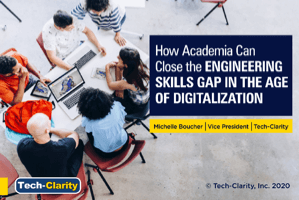 How can schools best prepare today’s STEM students to close the engineering skills gap so that new graduates are ready for the real world?
How can schools best prepare today’s STEM students to close the engineering skills gap so that new graduates are ready for the real world?
Tech-Clarity’s research report, “How Academia Can Close the Engineering Skills Gap in the Age of Digitalization” explores this question. This research shares a global perspective on what colleges and universities are doing to develop the engineering talent needed in the age of digitalization. It also examines the impact COVID-19 has had on instructions and offers lessons learned that can be used to improve the educational experience in the Fall, as well as in the future.
Please enjoy the summary* below. For the full research, please visit our sponsor, Siemens (registration required).
Table of Contents
- Executive Summary
- Meet Industry Needs
- Embrace Digitalization
- Prepare for the New Corporate Culture
- Opportunities for Improvement
- Adapt to the Needs of the 2020s
- 1. Offer Long Term, Realistic Projects
- 2. Reshape the Curriculum
- 3. Leverage Software
- 4. Enhance Learning with Digital Twins
- 5. Enrich Learning with Technology
- 6. Develop Collaboration Skills
- 7. Prepare for Cross-Functional Horizontal Teams
- 8. Build Resumes and Offer Career Insight
- 9. Partner with Industry for Technology Thought Leadership
- Conclusions
- Recommendations
- Acknowledgments
Executive Summary
 Requirements for New Engineers
Requirements for New Engineers
Industry needs more engineering graduates. New engineers must be comfortable with cross discipline projects, a range of technology including digitalization, and horizontal organizations. Along with this deep skillset, industry wants engineers to be strong problem solvers with the aptitude to apply technology to solve problems. Previous Tech-Clarity research finds that industry believes schools could do better to meet these requirements.
Requirements for Learning Approaches
Much of this is due to the traditional lecture-based approach to education. By reshaping the curriculum to focus on project-based learning and partnering with industry thought leaders, there is tremendous opportunity to improve students’ education.
This Research
This research builds upon past Tech-Clarity research, Close the Engineering Skills Gap when over two hundred companies were surveyed to identify specific skills industry wants to see in graduating engineers.
For this new research, educators from around the world were interviewed to understand what schools are doing to better prepare their students. This report details different perspectives and shares advice to evolve the curriculum to meet today’s needs.
COVID-19
The research explores how some schools have embraced digitalization, incorporated the latest technology trends, and leveraged industry partnerships. It also shares lessons learned as a result of the COVID-19 pandemic.
 Schools should:
Schools should:
- Offer long term realistic projects
- Reshape the curriculum
- Leverage software
- Enhance learning with digital twins
- Enrich learning with technology
- Develop collaboration skills
- Prepare for horizontal cross-functional teams
- Build resumes and offer career insight
- Partner with industry for technology thought leadership
These steps will help schools better prepare engineering students for industry, and recruit top talent in the future.
Recommendations
Next Steps

Based on this research and our experience, Tech-Clarity offers the following recommendations:
-
Restructure academic programs to maximize project-based learning opportunities. This can be done as part of the regular curriculum or as extracurricular actives.
-
Recognize the numerous benefits of project-based learning for both students and industry. Design programs to ensure that participants realize these benefits.
-
Involve industry to provide real-world problems as well as mentorships and internships to ensure students have the opportunity to learn from their experiences and expertise.
-
Projects need to develop problem-solving and collaboration skills, while exposing engineers to multi-discipline work
-
Reshape the curriculum and remove content that is less valuable for today’s engineers.
-
Bring in industry thought leaders and subject matter experts into the classroom.
*This summary is an abbreviated version of the research and does not contain the full content. A link to download the full report is available here.
If you have difficulty obtaining a copy of the report, please contact us.

